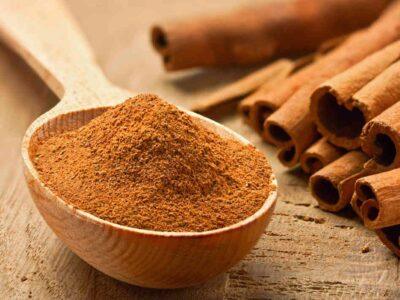Maybe you add it to your oatmeal or use it in your hot apple cider. Perhaps you sprinkle it on your toast or use it to make your home smell warm and inviting during the Christmas season. But did you know there are many other uses for that container of cinnamon in your kitchen?
One of the world’s oldest and most familiar spices, cinnamon has anti-bacterial, anti-fungal and antioxidant powers. Many cultures, including traditional Chinese medicine, revere it for its healing powers. Cinnamon [2] contains calcium, iron, manganese and fiber, and its bark is used to make essential oils.
Cinnamon is the brown bark of the cinnamon tree, and it is available in its dried tubular stick form (known as quills) or as a ground powder. The two most common varieties of cinnamon are Chinese and Ceylon. Both have a similar flavor, but Ceylon is thought to have a slightly sweeter and more delicate taste. Ceylon cinnamon is produced in the Caribbean, Sri Lanka, Madagascar, India and Brazil, while Chinese cinnamon (sometimes called cassia) is mainly produced in China, Indonesia and Vietnam.
When shopping for cinnamon, look for sticks which are compact and light brown in color (the Ceylon variety) or dark brown (Chinese variety). Check that your powdered cinnamon is pure cinnamon and does not have other spice powders mixed with it.
Store your cinnamon in a cool, dry place in an airtight glass container, and it will keep for up to a year. You also can extend the spice’s life by storing it in the refrigerator. To find out if your cinnamon is still fresh, simply do an aroma test. If it does not smell sweet, it should be discarded.
Most grocery stores in the United States sell Chinese cinnamon or cassia. The beneficial effects listed below are based upon Ceylon cinnamon. It is a little harder to find and is more expensive than the cassia varieties. Other than taste (and price), a critical difference between the two is their coumarin content. Coumarin is a naturally occurring toxin which has been connected with liver damage when consumed in very high doses. Cassia often contains measurable amounts of coumarin, while Ceylon cinnamon contains only trace amounts of coumarin.
Here are some surprising uses for cinnamon other than as a spice.
1. Soothe a sore throat. Cinnamon contains a water-soluble fiber, called mucilage which both soothes and coats the throat. Soak cinnamon sticks in cold water for several hours and then sip for pain relief.
2. Brain booster. Taking a whiff now and then of cinnamon has been found to help keep people more focused and alert. Stick a few in your desk, purse or backpack.
3. Insect repellant. You can use cinnamon along with cloves and peppercorns to create your own homemade moth repellent. Just break a few sticks into pieces and then combine them with a half cup of whole black peppercorns and a half cup of whole cloves. Place small sachets filled with the mixture in your closet or wherever you have a moth problem. They are much safer and more pleasant-smelling than moth balls!
Ants [4] also dislike cinnamon. Sprinkle some around any openings or cracks that provide ants entry into your home, and they will avoid the area.
Cinnamon oil’s anti-microbial qualities make it effective as a head lice treatment. It also is effective in killing mosquito larvae.
4. Skin cleanser. Cinnamon is a natural way to treat facial blemishes and acne. Mix together a teaspoon of powdered cinnamon with three tablespoons of honey. Apply to your trouble spots and let the paste sit on your skin for a few hours (or overnight) before rinsing well with warm water.
5. Breath freshener. Cinnamon is a refreshing way to fight bad breath. Simply chew on a few cinnamon sticks or gargle with cinnamon mixed with warm water to freshen your mouth.
6. Skin softener. Combine the antioxidant powers of cinnamon and lemons to create this soothing foot soak: mix the juice of five fresh lemons, one-fourth cup of whole milk, one-half cup of warm water, one tablespoon of olive oil with two tablespoons of ground cinnamon. Now soak your feet in the solution for about 15 minutes.
7. Insect bite remedy. Use a mixture of cinnamon and honey to naturally take the pain, itch and irritation out of an insect bite.
8. Air freshener. Use cinnamon as part of a potpourri [5] along with other spices such as cloves or use cinnamon oil as a liquid freshener. Simply combine water with a few drops of cinnamon oil in a spray bottle. Instant air freshener!
9. Food preservative. Adding a pinch of cinnamon to your recipe helps prevent spoiling and will help delay the growth of bacteria. Similarly, if you are prone to yeast infections, adding cinnamon, with its anti-fungal properties, to your diet has been shown to combat the yeast.
10. Muscle relaxer. Cinnamon oil combined with a carrier oil is often used by massage therapists to relax clients and to relieve their muscle pain. At home, try adding a few drops to your bath water for a soothing effect.
Do you know of other uses for cinnamon? Leave your tips in the section below:
Get $600 Worth Of Survival Blueprints … Absolutely Free! [6]

